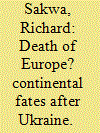| Srl | Item |
| 1 |
ID:
138949


|
|
|
|
|
| Summary/Abstract |
The unravelling of the post-Cold War security order in Europe was both cause and consequence of the crisis in Ukraine. The crisis was a symptom of the three-fold failure to achieve the aspirations to create a ‘Europe whole and free’ enunciated by the Charter of Paris in 1990, the drift in the European Union's behaviour from normative to geopolitical concerns, and the failure to institutionalize some form of pan-continental unity. The structural failure to create a framework for normative and geopolitical pluralism on the continent meant that Russia was excluded from the new European order. No mode of reconciliation was found between the Brussels-centred wider Europe and various ideas for greater European continental unification. Russia's relations with the EU became increasingly tense in the context of the Eastern Partnership and the Association Agreement with Ukraine. The EU and the Atlantic alliance moved towards a more hermetic and universal form of Atlanticism. Although there remain profound differences between the EU and its trans-Atlantic partner and tensions between member states, the new Atlanticism threatens to subvert the EU's own normative principles. At the same time, Russia moved from a relatively complaisant approach to Atlanticism towards a more critical neo-revisionism, although it does not challenge the legal or normative intellectual foundations of international order. This raises the question of whether we can speak of the ‘death of Europe’ as a project intended to transcend the logic of conflict on the continent.
|
|
|
|
|
|
|
|
|
|
|
|
|
|
|
|
| 2 |
ID:
131478


|
|
|
|
|
| Publication |
2014.
|
| Summary/Abstract |
In the first decade or so after the breaking up of the Soviet Union and the independence of the Central Asian states there was an explosion in literature dealing with Islam in the region. Very little of it, however, was based on extensive fieldwork. Furthermore, most of these studies tended to be guided by security and geopolitical concerns and mainly focused on the question of whether there was a risk that militant or radical Islam might gain a foothold in the region. People's everyday religious practice and experiences and their ideas about Islam, on the other hand, were very much neglected.
|
|
|
|
|
|
|
|
|
|
|
|
|
|
|
|